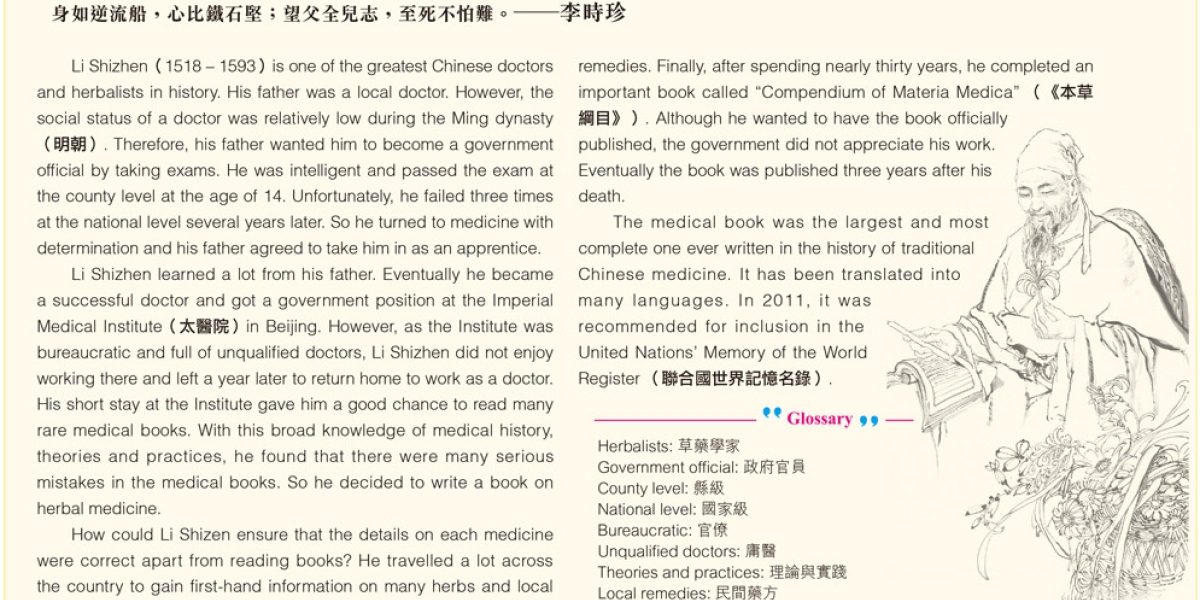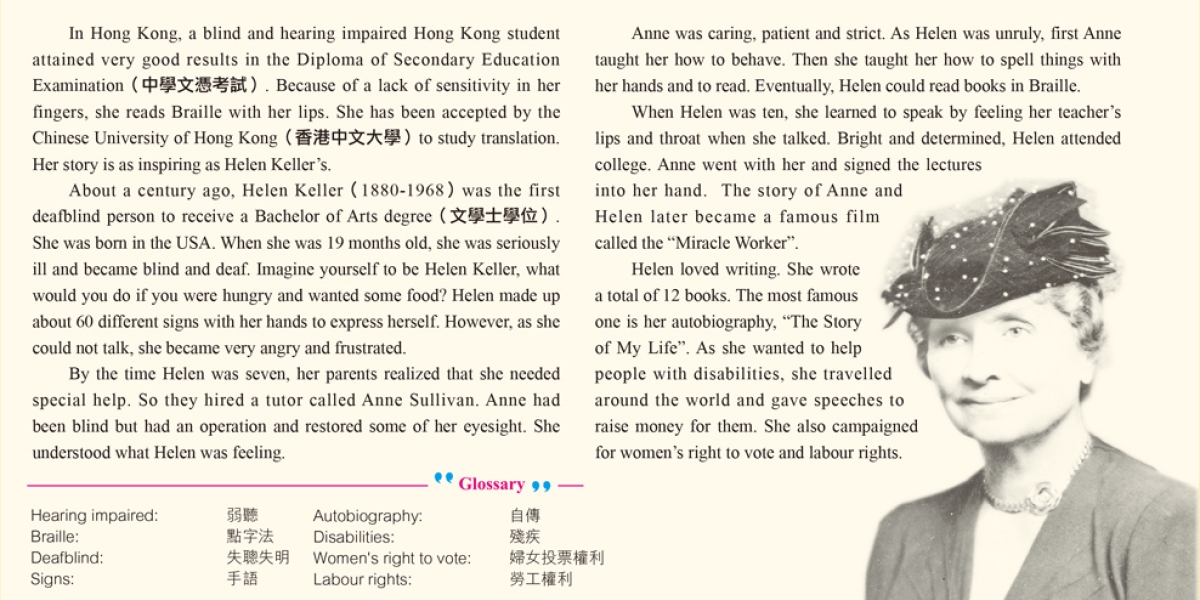昔日文章


Famous Quotations
2013.12.15
"We wish you a Merry Christmas and a Happy New Year." --Traditional
I am quite sure all of you can sing this Christmas song nicely. Do you know who wrote it? No one knows who its author and composer are. However, historians believe that it can be traced back to England in the 16th century. This was often the last song carol singers sang. There are several versions of the words. Below is one of the versions:
We wish you a Merry Christmas; We wish you a Merry Christmas;
We wish you a Merry Christmas and a Happy New Year.
Good tidings we bring to you and your kin;
We wish you a Merry Christmas and a Happy New Year.
Now bring us some figgy pudding; Now bring us some figgy pudding;
Now bring us some figgy pudding and a cup of good cheer.
Good tidings we bring to you and your kin;
We wish you a Merry Christmas and a Happy New Year.
We won’t go until we get some; We won’t go until we get some;
We won’t go until we get some, so bring some out here.
Good tidings we bring to you and your kin;
We wish you a Merry Christmas and a Happy New Year.
Imagine yourself to be one of the carol singers on Christmas Eve during that time. After you had finished carol singing, wealthy people would give you treats like “figgy pudding”. The pudding was made from figs, egg, orange peel, nuts, cinnamon, ginger and other spices.
Do you plan to join carol singing this coming Christmas? Which other Christmas songs can you sing?
Glossary
Composer:作曲家
Carol: 聖誕頌歌(報佳音)
Versions:版本
Good tidings: 佳音
Kin: 家人
Figgy pudding:無花果布丁
Cinnamon: 肉桂
Spices:香料


Famous Quotations
2013.11.24
I am sure the grapes are sour. “Aesop’s Fables” |我肯定這些葡萄是酸的。──《伊索寓言》
From this quote, can you tell which fable it comes from? The quote is said by the fox in the famous fable called “The Fox and the Grapes”. Nowadays, the phrase “sour grapes” has become an idiom. It is used to describe someone who says something is worthless because they have not got those things that they wanted.
Aesop is the name of the story-teller who told these famous fables more than 2,500 years ago. It is believed that Aesop did not write anything down. Fortunately, many years after his death, people wrote down his fables and passed them down from generation to generation. Over the centuries, his fables have been rewritten and translated into many languages numerous times. However, no one knows exactly when the first book of “Aesop’s Fables” was written.
Although “Aesop’s Fables” are well-known in the world, there is little information about the life of Aesop. Some historians say that he was a slave who lived in ancient Greece and was later freed by his master. Others say that Aesop was an ugly, deformed dwarf. Some even believe that Aesop never really existed.
Children love these fables a lot because the characters are usually animals who act and talk like people. Children also learn a lot because each of them tells a moral and teaches a lesson. Can you name a few more Aesop’s fables that you like best ? Below is a list of popular ones :
The Tortoise and the Hare
The Ant and the Grasshopper
The Lion and the Mouse
The Dog and the Shadow
The Wolf’s in Sheep’s Clothing
What moral does each of them tell you?
Idiom : 諺語
Worthless : 毫無價值
Rewritten : 改編
Translated : 翻譯
Slave : 奴隸
Deformed dwarf : 畸形的侏儒
Characters : 人物
Moral : 寓意


Famous Quotations
2013.11.03
Li Shizhen | 李時珍
My body is like a boat in the counter current and my heart is like a strong stone. I hope, Father, you will let me fulfil my ambition and I will fear no difficulties until death. — Li Shizhen
身如逆流船,心比鐵石堅;望父全兒志,至死不怕難。──李時珍
Li Shizhen(1518 – 1593)is one of the greatest Chinese doctors and herbalists in history. His father was a local doctor. However, the social status of a doctor was relatively low during the Ming dynasty (明朝). Therefore, his father wanted him to become a government official by taking exams. He was intelligent and passed the exam at the county level at the age of 14. Unfortunately, he failed three times at the national level several years later. So he turned to medicine with determination and his father agreed to take him in as an apprentice.
Li Shizhen learned a lot from his father. Eventually he became a successful doctor and got a government position at the Imperial Medical Institute(太醫院)in Beijing. However, as the Institute was bureaucratic and full of unqualified doctors, Li Shizhen did not enjoy working there and left a year later to return home to work as a doctor. His short stay at the Institute gave him a good chance to read many rare medical books. With this broad knowledge of medical history, theories and practices, he found that there were many serious mistakes in the medical books. So he decided to write a book on herbal medicine.
How could Li Shizen ensure that the details on each medicine were correct apart from reading books? He travelled a lot across the country to gain first-hand information on many herbs and local remedies. Finally, after spending nearly thirty years, he completed an important book called “Compendium of Materia Medica” (《本草綱目》). Although he wanted to have the book officially published, the government did not appreciate his work. Eventually the book was published three years after his death.
The medical book was the largest and most complete one ever written in the history of traditional Chinese medicine. It has been translated into many languages. In 2011, it was recommended for inclusion in the United Nations’ Memory of the World Register (聯合國世界記憶名錄).
Herbalists: 草藥學家
Government official: 政府官員
County level: 縣級
National level: 國家級
Bureaucratic: 官僚
Unqualified doctors: 庸醫
Theories and practices: 理論與實踐
Local remedies: 民間藥方


Famous Quotations
2013.10.20
Helen Keller | 海倫.凱勒
Although the world is full of suffering, it is full also of the overcoming of it. — Helen Keller
雖然這個世界充滿苦難,但是也充滿解決克服的方法。──海倫.凱勒
In Hong Kong, a blind and hearing impaired Hong Kong student attained very good results in the Diploma of Secondary Education Examination(中學文憑考試). Because of a lack of sensitivity in her fingers, she reads Braille with her lips. She has been accepted by the Chinese University of Hong Kong(香港中文大學)to study translation. Her story is as inspiring as Helen Keller’s.
About a century ago, Helen Keller(1880-1968)was the first deafblind person to receive a Bachelor of Arts degree(文學士學位). She was born in the USA. When she was 19 months old, she was seriously ill and became blind and deaf. Imagine yourself to be Helen Keller, what would you do if you were hungry and wanted some food? Helen made up about 60 different signs with her hands to express herself. However, as she could not talk, she became very angry and frustrated.
By the time Helen was seven, her parents realized that she needed special help. So they hired a tutor called Anne Sullivan. Anne had been blind but had an operation and restored some of her eyesight. She understood what Helen was feeling.
Anne was caring, patient and strict. As Helen was unruly, first Anne taught her how to behave. Then she taught her how to spell things with her hands and to read. Eventually, Helen could read books in Braille.
When Helen was ten, she learned to speak by feeling her teacher’s lips and throat when she talked. Bright and determined, Helen attended college. Anne went with her and signed the lectures into her hand. The story of Anne and Helen later became a famous film called the “Miracle Worker”.
Helen loved writing. She wrote a total of 12 books. The most famous one is her autobiography, “The Story of My Life”. As she wanted to help people with disabilities, she travelled around the world and gave speeches to raise money for them. She also campaigned for women’s right to vote and labour rights.
Hearing impaired: 弱聽
Braille: 點字法
Deafblind: 失聰失明
Signs: 手語
Autobiography: 自傳
Disabilities: 殘疾
Women's right to vote: 婦女投票權利
Labour rights: 勞工權利


